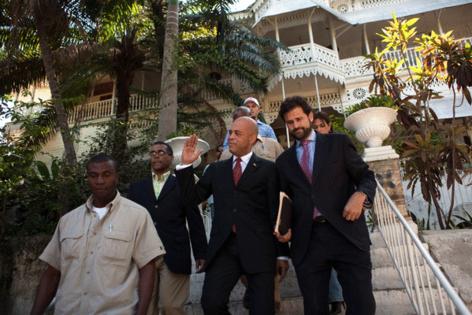Gangs burn down Haiti's iconic Hotel Oloffson, host to stars and writers
Published in News & Features
Haiti’s storied Hotel Oloffson, a favorite haunt of writers and artists that survived dictatorship, coups and a devastating earthquake and was immortalized in novelist Graham Greene’s “The Comedians,” is no more.
After months of resisting gang threats and attacks that forced thousands in its surrounding Carrefour Feuilles neighborhood to abandon their homes and flee, the landmark hotel overlooking Haiti’s capital was “burned to the ground” Saturday evening into Sunday morning. The hotel’s burning was confirmed to the Miami Herald by proprietor Richard A. Morse, who also announced the destruction on X, after drone images began circulating showing its hollowed out structure.
The culprits: members of the Viv Ansanm gang coalition, who had been using the sprawling hotel as a base for their takeover of Port-au-Prince and have been fighting with Haitian national police officers. Another source who confirmed the hotel’s destruction said it was among several places in the area gangs burned during the confrontation with police, which intensified on Saturday afternoon.
“Losing the Oloffson reflects the incompetence of Haiti’s oligarchs, the Haitian government, the United Nations as well as the French and American governments,” said Morse, an outspoken critic of Haiti’s wave of crises and ongoing political instability.
The founder of RAM, a Haitian roots band named after him, Morse took over the famed hotel in 1987 after it had been closed a year earlier. At the time it was in near ruins after having once served as a media hub for visiting press during the years of the Duvalier dictatorship. The musician soon transformed the Oloffson into a gathering place for Haitian culture featuring folkc dancers and Vodou rock performances.
His band’s weekly Thursday performances along the hotel’s creaky, wooden balcony attracted both locals and tourists and became a must attend event as gawking visitors begged to see where Mick Jagger, Jackie Kennedy Onasis and Graham Greene once slept.
“Stepping into this magnificent gingerbread mansion with its cathedral ceilings, you could feel the lingering presence of legends —painters like Hector Hyppolite, Philomé Obin and André Pierre; dancer and choreographer Katherine Dunham; former First Lady Jacqueline Kennedy; Marlon Brando and Elizabeth Taylor during the filming of “The Comedians;” Charles Addams of The Addams Family; and James Jones, author of From Here to Eternity — to name just a few,” said Port-au-Prince political analyst and former hotel patron Michel Eric Gaillard.
“Sipping a glass of rum at the old Acajou bar, you might have imagined yourself seated beside Rolling Stones icon Mick Jagger, or witnessing Graham Greene in deep conversation with Aubelin Jolicoeur. Brushing your hand against its walls, you did so with reverence—closing your eyes to absorb the vibrations, the echoes, the voices of history,” he added. “The Oloffson withstood the 2010 earthquake, its wooden structure flexing with resilience as it stood tall above Port-au-Prince. But it could not defy manmade disaster. Like an old reel of film, it has faded into oblivion.”
Gaelle Delaquis, a promoter of Haitian culture, said the hotel’s destruction represents a great loss.
“I carry so many cherished memories of this cultural landmark,” she said. “It was my Thursday Mass, the birthplace of the original Gede Fest – a true symbol of unity, generational legacy and Haitian excellence.
“They can destroy our city, but not our spirit,” Delaquis added. “Our collective memory is our history.”
Gregory Brandt, a fan who also used to support cultural events at the hotel, is mourning the hotel’s destruction while trying to understand the logic.
“I am very said and don’t understand the use of fire,” Brandt said. “Take the house and move in, but the attraction for destruction and setting fire?”
Built in the late 19th Century, the Oloffson was initially a private home owned by the Sam family, who lived there until President Vilbrun Guillaume Sam in 1915 was lynched by an angry mob in the streets of Port-au-Prince. Sam had only been president for five months at the time of his death, which triggered a U.S. military intervention and a 19-year occupation of Haiti by U.S. marines.
Until President Jovenel Moïse’s equally brazen slaying four years ago, on July 7, 2021, Sam had been the last Haitian president to be assassinated.
During the U.S. occupation, the Oloffson was used by the marines as a hospital, and following the departure of American forces in 1934, it was converted into a hotel in 1935.
In 1960, Al Seitz, a New Yorker, became proprietor of the what was then called the “Ginger Bread” Grand Hotel Oloffson, and he transformed it into a haven for both local and visiting celebrities whose names graced the hotel’s rooms. In addition to Jagger and Greene, another draw was the Aubelin Jolicoeur room, named after the Haitian gossip columnist on whom Greene based his character Petit Pierre in “The Comedians.”
The Oloffson itself served as a muse for Greene’s fictional Trianon Hotel in “The Comedians,” which tells a tale of treachery and the absurdity of Haiti amid the rule of Francois “Papa Doc” Duvalier. The hotel was also the setting for the 1967 film “The Comedians,” starring Richard Burton and Elizabeth Taylor, in which Burton portrayed the hotel manager.
Seitz died in 1982 at the age of 64 of cancer, and years later Morse took over.
Under Morse’s management, the Oloffson braved deepening political instability, dried-up tourism, the 2010 earthquake and worsening gang violence. Still, its low room rates, lunches and rum sours continued to inspire a new generation of writers and foreign correspondents searching for news, as the hotel served as a repository for the latest political gossip and intrigue.
Despite curfews, it still attracted Haiti’s intellectuals, artists and foreign diplomats on its porch until the gang violence in Carrefour Feuilles and downtown Port-au-Prince completely made it off limits.
“The Oloffson has literally attracted everyone,” Morse said, noting that the late Anthony Bourdain, the celebrated chef and author, once listed it as among his five favorite spots in Haiti after visiting the country in 2011 to film season 7 of his show “No Reservations.”
The demise of the Oloffson follows a similar attack on The Lodge, a popular hotel in the hills above Port-au-Prince. The destruction is part of an alarming rise of violance against private homes and businesses by armed gangs that began ramping up their attacks at the beginning of the year. The violence is paralyzing Port-au-Prince, now up to 90% under gang control, and is quickly spreading to other regions of Haiti.
Late last week, at least eight people were reported killed in gang attacks in the Lascahobas area in the Central Plateau. The United Nations issued an alert for the region after armed gangs orchestrated an attack, intensifying the already precarious humanitarian crisis in the rural area.
Lascahobas was already hosting 7,455 internally displaced persons following gang attacks in April, the U.N. said. Now with the recent attacks, more Haitians have been forced to flee their homes.
In Port-au-Prince, gangs have continued to torch century-old homes in historic neighborhoods like Pacot, not far from the Oloffson hotel, and in the hills above the capital of Kenscoff.
Morse, who said he never understood why the hotel was listed as being in an off limits “red zone” back in the 2000s when the gang problem wasn’t what it is today, is vowing to rebuild.
“I’ll do everything I can to get it back on its feet in spite of the powers that be,” he said. “I feel free to finally speak out again. They can only burn it once.”
©2025 Miami Herald. Visit at miamiherald.com. Distributed by Tribune Content Agency, LLC.










Comments